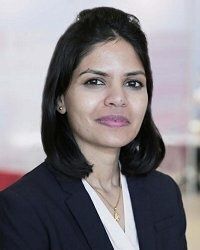
Greeshma Gadikota | New Frontiers in Carbon Transformations Coupled to Resource Recovery for a Sustainable Climate, Energy, and Environmental Future
Abstract: Our societal grand challenge lies in meeting the rising demand for energy and resources while limiting detrimental impacts on the climate and our environment. While tremendous advances have been made in ensuring the sustainability of our water and soil resources, significant scientific and technological advances are needed to co-produce multiple high-value resources with inherent management of greenhouse gas emissions. Therefore, advancing the science of fluid-solid interactions in complex environments and harnessing this understanding to develop novel and scalable pathways for carbon transformations integrated with resource recovery are crucial for a sustainable climate future. In this context, we will discuss the role of emerging understanding of the organization and transport behavior of nanoconfined fluids as it relates to the capture, storage, and utilization of CO2 in natural and engineered environments. Novel multi-phase chemical pathways for producing hydrogen with inherent carbon removal and hybrid absorption-crystallization pathways in CO2 sourced hydrometallurgical pathways will be discussed in this context. The role of naturally occurring minerals, distributed biomass resources, and low-value residues including alkaline residues in enabling our energy transition to a low-carbon future are evaluated.
Bio: Dr. Greeshma Gadikota is an Associate Professor and Croll Sesquicentennial Fellow in the School of Civil and Environmental Engineering with a field appointment in the Smith School of Chemical and Biomolecular Engineering at Cornell University. Dr. Gadikota directs the Sustainable Energy and Resource Recovery Group. She held postdoctoral research associate appointments at Princeton University and Columbia University, and a research associate appointment at the National Institute of Standards and Technology (NIST). Her PhD in Chemical Engineering and MS degrees in Chemical Engineering and Operations Research are from Columbia University. Her BS in Chemical Engineering is from Michigan State University. Her scientific contributions are recognized by the DOE, NSF and ARO CAREER Awards, Sigma Xi Young Investigator Award, Cornell Engineering Research Excellence Award, Inaugural Cornell Rising Women Innovator Award, AICHE Sabic Award for Young Professionals, and ACS Women’s Chemists Committee (WCC) Rising Star Award to list a few notable recognitions.
This event is presented as part of the 2024 Perspectives on the Climate Change Challenge Seminar Series:
Most Mondays, Spring Semester 2024, 2:55-4:10pmVia ZoomThis university-wide seminar series is open to the public (via Zoom), and provides important views on the critical issue of climate change, drawing from many perspectives and disciplines. Experts from Cornell University and beyond present an overview of the science of climate change and climate change models, the implications for agriculture, ecosystems, and food systems, and provide important economic, ethical, and policy insights on the issue. The seminar is being organized and sponsored by the Department of Biological and Environmental Engineering and Cornell Atkinson Center for Sustainability.